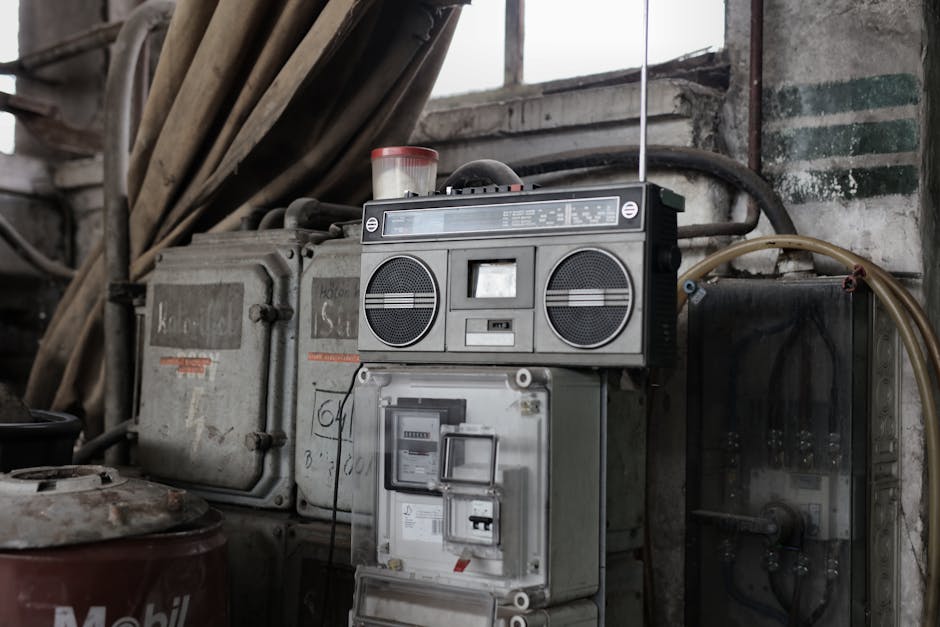
The Importance of Precision in Industrial Control Technology
Introduction to Industrial Control Technology
Industrial control technology is like the brain behind a factory’s machines. It’s what tells the machines what to do, when to start, when to stop, and how to do their job right. Imagine you’re playing a video game, and you’re using a controller. Now, think of the industrial control system as that controller, but for the entire factory. This technology includes things like sensors, controllers, and software that work together to keep everything running smoothly. Sensors gather information about what’s happening on the factory floor, controllers make decisions based on that info, and software gives the necessary commands to the machinery. It’s crucial for making sure factories can produce things efficiently, safely, and with the quality we all expect. Whether it’s making cars, packaging food, or producing energy, industrial control technology keeps the wheels turning.
The Role of Precision in Industrial Processes
In industrial settings, precision is not just a fancy word; it’s what separates success from failure. Think about it – when machines work with exactness, everything from production speed to product quality sees a big boost. Here’s the deal: without precision, equipment wears out faster, energy gets wasted, and the final product? Well, it might not meet the mark. Precision in industrial processes means using the right amount of materials, hitting the perfect temperature, and cutting or shaping parts to fit together just right. This not only saves money by reducing waste but also keeps machines running smoothly and extends their life. Plus, when products are made accurately, companies can avoid the costly recalls or reworks. So, precision? It’s not just important; it’s essential for any industry that wants to keep its gears turning efficiently and its customers happy.
Key Components of Industrial Control Systems
Industrial Control Systems (ICS) are like the brains behind factory operations, ensuring everything runs smoothly and efficiently. Let’s break down the key components you’ll find in these systems. First up, we’ve got the Programmable Logic Controllers (PLCs). These are the workhorses that take instructions and turn them into action, controlling machinery and processes based on specific programs. Next, there’s the Human-Machine Interface (HMI). This is how workers talk to the PLCs, giving commands and getting updates on operations. It’s all about making sure humans and machines can communicate easily. Then, there are Sensors and Actuators. Sensors collect data from the environment, like temperature or pressure, and send it back to the PLC. Actuators are the movers, taking commands to control the machinery, opening valves, starting motors, and more. We also have Industrial Networks that link everything together. This network ensures data flows smoothly between PLCs, HMIs, sensors, and actuators, keeping the entire operation connected. Lastly, we have the Supervisory Control and Data Acquisition (SCADA) systems. These are like the overseers, collecting data from across the ICS to monitor and control processes on a big scale, ensuring everything is running as it should. Each of these components plays a crucial role in keeping industrial operations safe, efficient, and reliable. Together, they create a system that’s more than just the sum of its parts.
Accuracy vs. Precision in Control Technology
In the world of industrial control technology, two terms often get mixed up: accuracy and precision. They’re not the same thing, but both are crucial. Let’s break it down. Accuracy means hitting the target. For example, if you’re aiming to fill a bottle with exactly 500 ml of water, and you hit that mark, that’s accuracy. Precision, on the other hand, is about consistency. Let’s stick with the bottle-filling example. If your machine fills each bottle to 495 ml, not hitting your 500 ml goal, but does so every single time with minimal deviation, that’s precision. In control technology, you really want both. You aim to hit your exact target (accuracy) in a consistent manner (precision). However, achieving both can be a challenge due to variables in manufacturing processes and the limitations of equipment. The key is to regularly calibrate equipment, ensure high-quality components are used, and maintain a controlled environment as much as possible. Both accuracy and precision play vital roles in product quality, efficiency, and cost management. If your operations miss the mark on either, it could mean wasted materials, time, and a compromise on quality.
Impact of Precision on Safety and Efficiency
Precision in industrial control technology isn’t just a fancy term; it’s critical for both safety and efficiency. When machines and systems operate with high precision, the risks of accidents and malfunctions drop significantly. Think about it—precise equipment means fewer errors. Fewer errors mean fewer accidents. And fewer accidents mean a safer environment for everyone. On the efficiency front, precision allows for faster production without sacrificing quality. Less waste is produced when machines work exactly as they’re supposed to, saving both resources and money. In summary, improving precision isn’t just about doing things right; it’s about doing things better, safer, and more cost-effectively.
Challenges in Achieving High Precision
Achieving high precision in industrial control technology is no small feat. It’s like hitting a bullseye in a windstorm. First off, there’s the issue with the equipment itself. It’s pricey. High-quality sensors and control systems that offer the precision needed for tasks, say in semiconductor manufacturing or robotics, can make a sizable dent in a company’s budget. Then, there’s the human element. Even with top-notch tech, you need skilled people who know how to handle it. These experts are rare and they know their worth, pushing up labor costs.
Another big hurdle? The environment. Imagine trying to work with micron-level precision when every vibration, temperature fluctuation, or speck of dust can throw off your measurements. Companies often have to invest in specialized, controlled environments, which amps up costs even more.
Lastly, let’s not forget about the software. It’s the brain of the operation, but crafting software that can process data and make decisions with high accuracy is easier said than done. Plus, this software needs regular updates and maintenance to keep up with the ever-evolving tech landscape.
So, yes, while the rewards of high precision can be great, the journey there is fraught with challenges that can test the resolve of even the most determined companies.
Technological Innovations Enhancing Precision
In the realm of industrial control technology, staying ahead means embracing the latest innovations. These aren’t just flashy new gadgets; they’re the backbone of efficiency and precision in manufacturing, energy management, and more. One big game changer has been the rise of IoT, short for the Internet of Things. This technology connects equipment and devices, allowing for real-time monitoring and adjustments. Imagine a factory where machines adjust themselves on the fly based on data they receive. That’s not the future; it’s happening now.
Then, there’s AI and machine learning. These aren’t just buzzwords. They are tools that learn and improve over time, making processes faster and more precise without constant human intervention. For instance, an AI system can predict when a machine is likely to fail and suggest maintenance, ensuring everything runs smoothly.
Robotics has also taken a giant leap forward. Robots today are more adaptable and can perform tasks with the kind of precision that humans can’t match, from assembling tiny components to handling delicate materials without breaking a sweat.
In the end, these innovations mean products are made faster, with fewer errors, and often at a lower cost. For industries, staying competitive means keeping up with these tech advances. Precision isn’t just about doing things well; it’s about doing them better and smarter every single day.
Case Studies: Success Stories in Precision Control
In the world of industrial control, precision is not just a buzzword; it’s the backbone of efficiency and safety. Let’s dive into a few case studies that highlight the monumental impact precision control has had on industries. First, consider a car manufacturer that integrated high-precision sensors and advanced control algorithms into their assembly lines. The result? They slashed production errors by nearly 30% and ramped up output by 20%. This not only saved costs but also significantly improved product quality. Then there’s the story of a chemical plant. By employing precise control technologies to monitor and adjust temperatures, pressures, and flow rates in real-time, they managed to reduce wastage and improve yield by 15%. This precision also bolstered safety by minimizing the risk of hazardous conditions. Both examples showcase how investing in precision control technology translates into tangible benefits like increased efficiency, reduced waste, and enhanced safety. These success stories aren’t exceptions; they’re beacons for industries worldwide to follow suit.
Future Trends in Industrial Control Technology
In the evolving world of industrial control technology, future trends are all about smarter, faster, and more sustainable solutions. A big thing on the horizon is the integration of Artificial Intelligence (AI) and the Internet of Things (IoT). AI is getting sharper at predicting machine failures before they happen, reducing downtime and saving money. Meanwhile, IoT makes machines talk to each other in ways we never thought possible, optimizing production lines without human intervention. Then there’s cloud computing, pushing data storage and processing into the sky, making information accessible everywhere, all the time. These are not just fancy gadgets and ideas; they’re about making factories and plants more efficient, less energy-consuming, and a lot safer. Ready or not, these trends are setting the stage for a revolution in how we think about and run industrial operations.
Conclusion: The Value of Precision in Industry
Precision in industrial control technology isn’t just a fancy term; it’s the backbone of modern industry. When machines work with exact precision, we see less waste, fewer errors, and products of a consistently high quality. This leads directly to higher profits and a stronger competitive edge. Remember, even a small deviation in a process can cause big problems, costing time and money to fix. Embracing precision means investing in the future of your industry, ensuring operations run smoothly, and keeping customers satisfied. So, it’s clear, the value of precision in industrial technology is immense, impacting every aspect of production from efficiency to the bottom line. Keep precision at the heart of your operations; it’s a game-changer.



